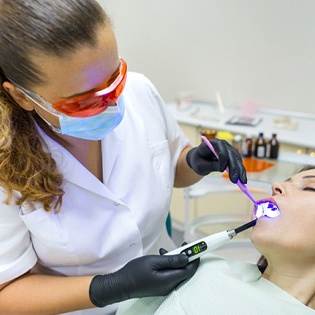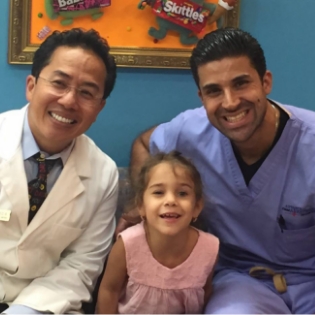Sleep Dentistry – Tappan, NY
An Effective Solution to Achieve a Relaxed State
Does dental anxiety keep you from getting the care you need? At Smile More Dentistry, we’re here to help. Our team in Tappan offers safe and effective sleep dentistry options designed to ease your fears and make your visit as comfortable as possible. With sleep dentistry, you can receive treatment without the stress of sights, sounds, or sensations that may normally cause anxiety. This option is available for patients of all ages, and we take every precaution to keep you relaxed and safe throughout your appointment. Want to learn more? Contact our office today to schedule a visit.

Why Choose Smile More Dentistry for Sleep Dentistry?
- Highly-Qualified Dental Team with Years of Experience
- Safe and Effective for Patients of All Ages
- Ideal for Individuals Having Multiple Procedures at One Time
Who Is Sleep Dentistry For?

Sleep dentistry can make dental care easier and more comfortable for patients who find traditional visits stressful. It’s especially helpful in situations where anxiety, sensitivity, or longer treatments may otherwise prevent someone from getting the care they need.
- Experience dental anxiety or fear
- Have a sensitive gag reflex
- Need multiple procedures or complex treatment
- Struggle to sit still for long appointments
- Have children or special needs that make dental visits overwhelming
If you or your child fit into any of these categories, sleep dentistry could be the solution that makes dental care possible, and even pleasant.
How Easy Is It?

Getting started with sleep dentistry is easier than you might think. From your first call to the moment you wake up with a healthier smile, our team makes the entire process comfortable, safe, and stress-free.
- Schedule your visit – Call us and let us know you’re interested in sleep dentistry.
- Come in relaxed – Our highly trained anesthesiologist, Dr. Mendia, will guide you every step of the way.
- Wake up with a healthier smile – You’ll be comfortable, safe, and amazed at how effortless the process feels.
It’s truly dentistry while you sleep—so you can restore your smile without the fear or stress.
What is Sleep Dentistry?
Treatment is administered by a board-certified anesthesiologist, Dr. Mendia, and is especially helpful for patients with severe dental anxiety, those who need several procedures completed in one visit, or children with special needs who may have difficulty staying calm. The medication is delivered through a gentle IV and works quickly to create a calming, relaxed feeling. While you won’t be fully asleep, many patients describe it as being in a dreamlike state. You’ll remain conscious and able to respond to your dentist, but without the usual stress or worry.
How Sleep Dentistry Works

At the start of your visit, Dr. Mendia will check your blood pressure to make sure it’s at a safe level. The IV sedation is then gently administered through a small tube in your hand or arm, with the medication taking effect within minutes. During your procedure, your pulse and oxygen levels are continuously monitored to ensure your comfort and safety.
After treatment, your blood pressure will be checked again, and you’ll spend a short time in the office so the team can make sure you’re recovering smoothly. Because the effects can take a little while to wear off, you’ll need someone to escort you to and from your appointment.
Children & Special Needs Sleep Dentistry
Sleep dentistry can be especially helpful for children and patients with special needs who may feel anxious or have difficulty sitting still during treatment. By creating a calm, dreamlike state, it allows dental care to be completed safely and comfortably. With the support of a board-certified anesthesiologist, every precaution is taken to ensure a smooth, reassuring experience for both patients and families.
What to Expect Afterwards

Once our team is finished with your dental work, you will not be able to get up and leave just yet. It is normal for you to feel drowsy for several hours afterward, which is why you will need someone taking and picking you up from your appointment.
You will receive detailed instructions by our team as to what you can expect and what you should do once you are home. A few things you will want to avoid until the effects fully wear off include:
- Strenuous exercise/activity
- Alcohol consumption or operating any vehicle/machinery
- Certain medications
Sleep Dentistry FAQ's
What is a dentist anesthesiologist?
A dentist anesthesiologist is a dentist that has completed a post-doctoral residency in anesthesiology after the completion of four years at an accredited Dental School. The post-doctoral residency consists of at least two years of medical-based anesthesiology, which includes providing anesthesia in the operating room as well as outpatient procedures.
How does a Dentist Anesthesiologist differ from a dentist who offers Sleep Dentistry?
A dentist that provides sedation generally completes a continuing education course and is limited to administering one type of anesthesia: conscious sedation, usually with one or two medications. A dentist anesthesiologist has an unrestricted General Anesthesia permit with the ability to administer all levels of anesthesia: moderate sedation through general anesthesia, using a variety of anesthetic agents and anesthetic techniques.
Why Is Anesthesia Necessary?
Complex Dental treatments, needle-phobic or anxious patients, patients with special needs, and children could benefit from anesthesia. The degree of anesthesia in such cases can vary from moderate sedation to general anesthesia. Dr. Mendia is well trained at providing all levels of anesthesia so that your dentist can fully focus on your dental procedure. This allows for a safer, more predictable, and comfortable experience for both the patient and the dentist. Anesthesia eliminates pain and anxiety during the procedure, allowing the dentist to efficiently perform the dental procedures while reducing patient anxiety and emotional stress.
What type of Patients are candidates for anesthesia?
Everybody can safely receive anesthesia. Dr. Mendia is experienced and trained to care for patients of all ages. Dr. Mendia routinely cares for pediatric patients, dental phobic patients, anxious patients, patients with special needs as well as adults and geriatric patients.
Do you treat patients with special needs?!
Yes. Dr. Mendia has provided anesthesia for many patients with special needs and has helped them to access the dental care they need.
What types of dental services can be performed during Anesthesia?
Almost any dental procedure can be performed under anesthesia in a dental office. Procedures that have been performed include Comprehensive oral evaluations, Full Mouth Series Radiographs, cleanings, restorations, crown and bridge, root canals, extractions, bone grafts, sinus lifts, implants, periodontal surgery, osseous surgery, deep gingival cleanings, and oral biopsies.
I Need a Checkup & Cleaning I Have a Broken or Chipped Tooth I am Missing One or More Teeth I am in Pain or Had an Accident I Want to Improve My Smile I Want a Straighter Smile I am Looking for a Dentist for My Child I am Worried About Bad Breath & Bleeding Gums I Have Migraines, Headaches or Jaw Pain View Our Services



